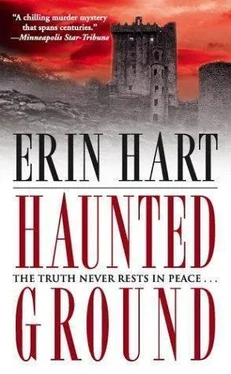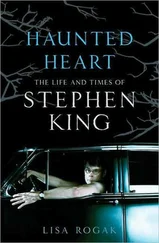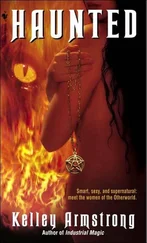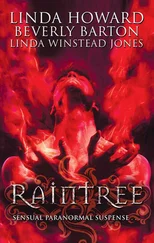Nora was about fifty yards ahead of him. He watched as she vanished beyond the end of the demesne wall, and followed, unsure whether to call out or keep silent. He plunged into the brush at the place he’d seen her disappear, only conscious of the danger she was in, not of the branches that whipped at his chest and face. He plowed through the wood before stumbling and falling hard, his ribs taking the brunt of the blow against a jagged stone. The pain in his side took his breath away, but he got up and forced himself to continue through the rocky maze of the chevaux-de-frise, until he came to the tower house. Nora stood outside the door, and as she swung it open, a golden light spilled out and seemed to surround her. The glow came from a hundred or more flickering candles inside the tower. Each of the tiny flames cast a wavering light, and the undulating shapes on the walls seemed to take on life and movement, an effect further exaggerated by his astigmatism. He stood for a moment, transfixed, before stepping inside. Jeremy Osborne sat at the foot of the stone staircase, arms wrapped tightly around his knees, rocking rapidly back and forth, as if he were in a trance.
“Jeremy,” Cormac said, “are you all right?”
The boy looked up. The wavering light accentuated both his thinness and the recent bruises, and the naked panic in his face. He picked up the first weapon he could find, a screwdriver, from the floor at his feet.
“Get out—get out!” he screamed, backing slowly up the first two steps. “You’re not supposed to be here. No one’s allowed in here!” Nora seemed about to speak, when Jeremy flung the screwdriver, which bounced harmlessly against the door behind Cormac’s head. Jeremy spun around and scrambled as fast as he was able up the crumbling stone stairway. Cormac followed, taking the steps two and three at a time, until he was suddenly engulfed in darkness.
“Jeremy,” he called. “Jeremy, wait.” The sound of footsteps continued, and Cormac could hear Nora shouting to him as well as he continued climbing blindly to the top of the tower, panting and dry-throated when he came out upon the battlements. The sky above was clear, and in the dark he could just make out the edge of the steep roof and the silhouettes of spindly weeds that sprouted from the cracks. He slid against the stone wall, stepping sideways cautiously; there was no telling when any of these floors or walls might give way, rotted as they were by centuries of neglect.
“Why did you have to come here?” Jeremy’s anguished voice cried from beyond the pitched roof beams.
“Jeremy, I’m sorry if we startled you. Everything’s all right.” There was nowhere to run, only a narrow circular walkway around the battlements, and Cormac stayed where he was. He didn’t want to lose access to the stairs below. Again he heard Nora’s voice, more urgent this time: “Cormac, you’ve got to come down.” He smelled the smoke in the same instant that he heard her voice. “There’s a fire—I can’t put it out. Cormac!”
“Jeremy, did you hear? We’re in danger if we stay here.” He inched along the wall, feeling his way with one arm, thinking he might be able to bring Jeremy along if he could only reach him. There was no time to lose. The smoke from below was getting thicker. He could hear the roar and crackle of the flames, and then a strangled cry from below.
“Nora, are you all right? Nora?” he shouted over his shoulder through the battlements, searching for her figure through the acrid smoke that billowed from the stairwell, filling his lungs and stinging his eyes.
“I’m here,” she shouted. He could hear that she was outside now, safe. “I’m all right. Jeremy, please come down. You can still make it.”
Cormac had edged his way around the top of the tower, moving toward the spot where he’d last heard Jeremy’s voice. “Come on,” he said. “There’s no more time.”
Cormac pictured the melting candles on their wooden crates, the dozens of paint cans, the stacks of books and papers, and the rotting beams that would begin to catch fire any minute. He knew that once a fire started, a tower house was little more than a giant chimney, its windowless walls containing and encouraging the flames upward until they burst out the roof. He was counting the seconds until it happened. Why did the boy delay?
“Leave me,” Jeremy shrieked. “Everything I do, everything I touch is fucked. It’s fucked. Just leave me.” He held his head in his hands, rocked his body against the wall in terror and despair.
“I can’t do that.”
The heat from the fire was becoming intense. There was no way they could go down the stairs now. Cormac pressed himself to the wall, and as he did, what was left of the tower roof gave way, crumbling into a gaping pit of fire before them. Jeremy let out a howl through clenched teeth, and pushed himself from the wall, as if to pitch himself headlong into it. Without thinking, Cormac lunged forward and seized the back of the boy’s shirt with one hand, nearly losing his balance, and pulling with all his strength until Jeremy’s full weight slammed back against him, knocking the wind from his chest. And with the force of the blow, time seemed to telescope. The spaces between seconds allowed an almost unbearably acute perception of each sensation as it passed through him. He was conscious of the grinding sound of stone and mortar giving way, of sharp pain and snapping tree branches, then falling, falling into darkness, and the earth seeming to meet him too soon, with a shuddering thump. And then silence. A most pure and sublime silence roared in his ears as he struggled to take a breath.
Then Nora was beside him, close, touching his face, saying, “Cormac, Cormac!” Her horrified face was upside down, and he wanted to laugh, but found tears starting to his eyes instead.
“Can you breathe? Just try to breathe. Please breathe!” He took a gasp of air, and began to cough. Nora turned her attention to the motionless shape just beside him. “He’s alive,” she said. “I’ve got to go for help. Don’t try to move.” She hesitated only a second before disappearing into the woods.
Beside him, Cormac could see Jeremy’s eyes flutter. The boy’s lips moved as though he would speak.
“No,” Cormac said. “Lie still.” Jeremy made a noise that was like a gurgling cough. Cormac desperately tried to remember what to do, but he couldn’t seem to think straight. He struggled up on one elbow, wincing in pain, and put his ear down to the boy’s lips, hoping he wouldn’t pass out himself. He heard a whisper.
“They’re here,” Jeremy said. “There’s a place underground.” He paused to gather what strength he could. “She knows,” the boy muttered urgently. “She knows. She’d never tell—” He lapsed into unconsciousness. Cormac felt himself sinking as well; his head drooped until it rested against Jeremy’s chest.
It is a grievous situation that has befallen Ireland
Wild blows heaped upon her by ruffians
Her nobility struck to the ground, unable to rise
Her heroes now heaps of bones.
—Irish poet Daibhi Cundun, 1651
When Cormac awoke, it was daylight, and Nora dozed in the chair beside his hospital bed. He wanted to speak, to let her know he was awake, but his head felt huge and thick. She stirred, looked about for a second, as if she didn’t quite remember where she was, then pulled her chair up to the bedside and put her face close to his. The mark of the crow’s sharp claw had begun to heal, but there were fresh, raw scratches where brambles had cut her face, and he dimly began to recall what had taken place. It seemed so long ago now.
Читать дальше











